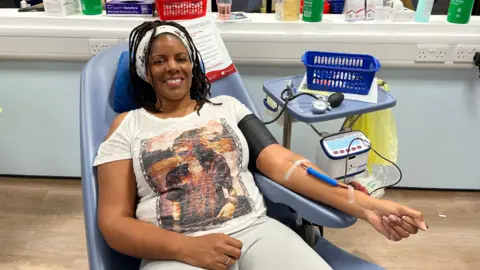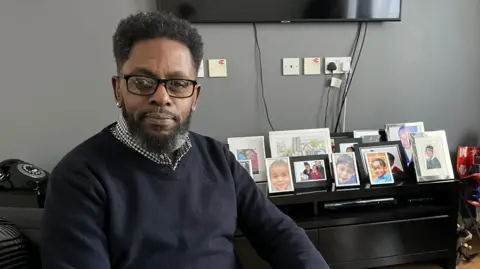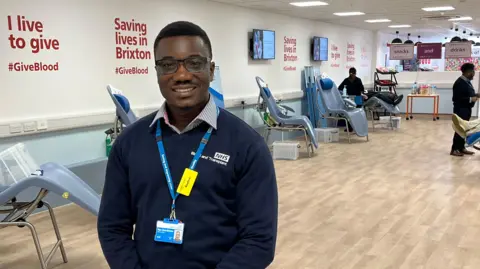South Londoners roll up their sleeves to save lives
 BBC
BBCBlood donors across south London may have potentially saved around 11,000 lives in the three months since Brixton's new blood donor centre first opened to the public, according to data from NHS Blood and Transplant.
Between December 2024 and February 2025, 3,773 people donated at the centre in south London, providing more than 3,000 units of blood. Each unit can save up to three lives.
Around 1,000 first-time donors were among those who chose to give blood in Brixton, and 50% were under 35 - twice as many as the national average.
More than half of black heritage blood donors have the RO blood sub-type, which is needed by people with sickle cell disease.
'I wake up in pain'
For Calvin Campbell, who has sickle cell disease, regular blood donations keep him alive.
"One of the main things about sickle cell is pain," he said. "I am always in pain; I have been in pain every second, every minute of every single day of my life since I was six months old.
"I go to sleep in pain, I sleep in pain and I wake up in pain.
"If it wasn't for the people who donate blood, people who have never met me, I literally would not be having this conversation. The only reason I am sitting here now is because of regular blood exchanges."

Leitita, from Lewisham, has been donating blood since she was 18.
"As soon as I was able to give blood, I was so excited to start doing it," she said,
"It is really amazing, especially hearing that there's so few black heritage donors that are donating. It makes it even more important for myself to continue keeping myself healthy so that I can continue donating.
"I have got a sub-type, the RO sub-type, and knowing that it helps a specific segment of my community was even more motivating for me to continue donating my blood."

Rexford Osei-Bonsu, manager of the Brixton donor centre, is encouraging more people to come forward to donate their blood.
"We have the capacity to deliver more than 1,000 appointments a week and are happy to work round your availability, whether that's on your way to work, during your lunch break or as you head home," he said.
"Giving blood is quick and painless. The entire appointment takes no longer than an hour and, in most cases, is much quicker. The actual time spent in the donation chair can be around 15 minutes.
"Donors can only give three to four times per year, so recruiting more donors is vital to securing London's blood stocks."
About sickle cell disease
- Sickle cell disease causes red blood cells to form into sickle or crescent shapes and become stuck in blood vessels, causing episodes of severe pain known as crises, as well as serious or even fatal complications, including organ damage and strokes.
- Many sickle cell patients rely on regular blood transfusions or full blood exchanges to proactively manage their symptoms, while others are given transfusions as an emergency treatment.
- A single patient receiving regular full blood exchanges can require blood from up to 100 donors each year.
Listen to the best of BBC Radio London on Sounds and follow BBC London on Facebook, X and Instagram. Send your story ideas to [email protected]
